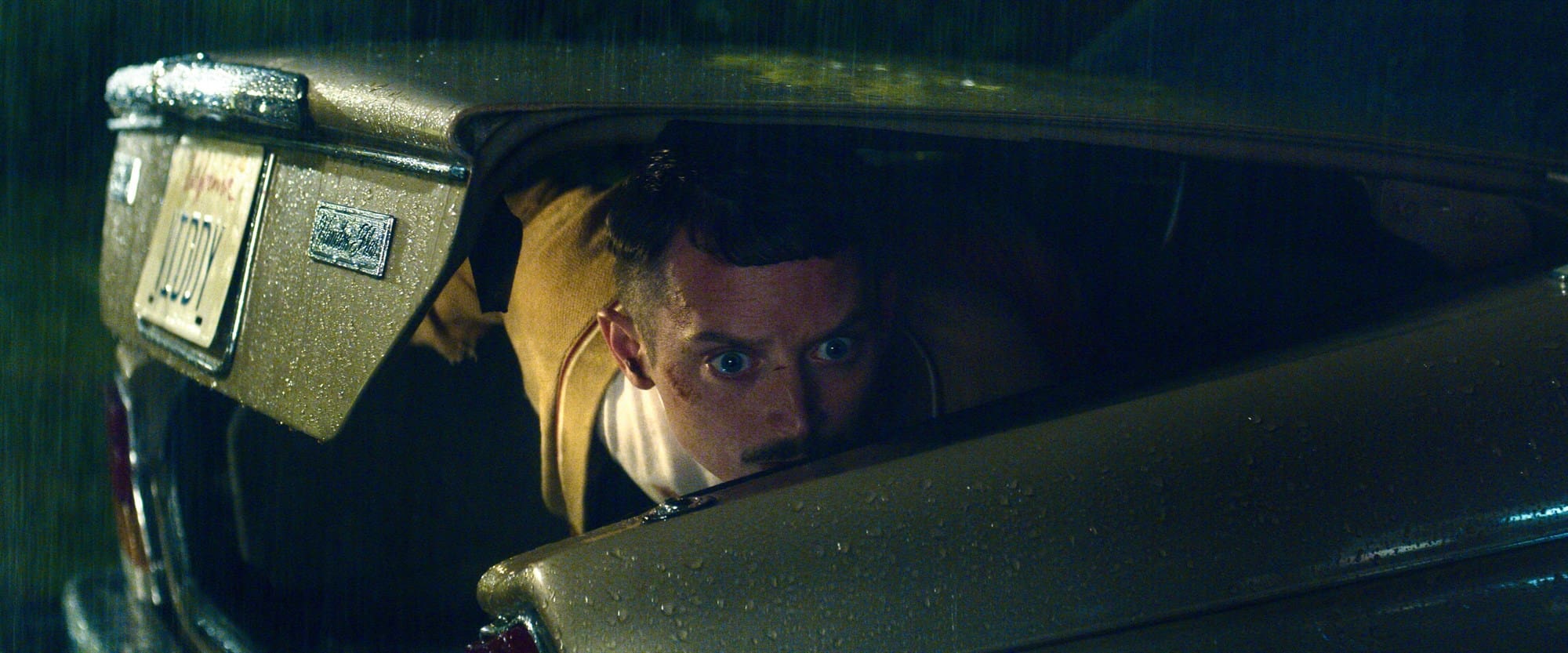
From the opening title card, you’ll know if you’ll like Come to Daddy. It starts with two quotes. The first is from Shakespeare: “The sins of the father shall be visited upon the sons.” The second is from the other great bard, Beyoncé: “There is no one else like my daddy.” The first suggests a serious film–maybe even a pretentious one–but the second makes it clear that writer Toby Howard, who developed the script based off an idea by director Ant Timpson, is also willing to approach a serious subject with a dash of humor and a knowing wink. It’s a delicate balance to strike, but the film, which premiered to a game audience at Tribeca last night, almost makes it look easy.
It follows Elijah Wood’s Norval, a depressed music producer who ventures to a remote cabin near a lake to reconnect with his father, played by Steven McHattie. Right from the start, we know something is off between them. It’s not just that Norval–who Wood said in a post-screening Q&A was styled after Skrillex–and his father–who dresses and acts like someone who raised hell in the ‘70s–don’t seem at all alike. Rather, it’s the sense that McHattie’s character not only regrets inviting Norval, but actively hates him.
One of the most striking examples comes when the pair share dinner. Norval’s father offers him some red wine, but he declines, explaining he had issues with, “alcohol dependency.” Given the disdain his father showed for Norval’s music career in an earlier scene, we know he’ll react similarly to his son’s euphemism for alcoholism. Still, we expect him to show at least some sympathy for Norval when he confesses that the addiction nearly drove him to commit suicide and shows the scars on his wrist. Instead, he locks eyes with his son, pours wine into his own glass nearly to the brim and then chugs it.
There and elsewhere, the antagonism between father and son in the film’s first half isn’t overt so much as quietly menacing. We know the film will eventually turn into a horror thriller of some kind, but we don’t know exactly how and the longer the audience waits, the more uncomfortable they become. And while the performances play a significant part in building that tension, it’s the filmmaking itself that’s most responsible.
Before the screening began last night, Timpson encouraged the projectionist to turn up the volume and it quickly became apparent why. While the dialogue and most of the sound effects are at a normal level, sound mixer Chris Hiles jacks them up for any loud bang or exclamation, forcing the audience to jump in shock every time they start to feel comfortable. Even more unnerving are the moans and bangs the house itself (a real cabin on Vancouver Island that Norval rightly insists looks like a, “UFO from the 1960’s”) makes. On some level, they’re meant to emphasize Norval’s sense of alienation in this strange house in the middle of nowhere, but once the film reveals what’s really happening, it ties into the plot too.
It is extremely difficult to talk about that plot without spoiling all the fun it holds, but it would also be a sin to ruin the gore-y, gonzo surprises of the film’s second half. Both tonally and in terms of its cast size, the film broadens and turns from tense thriller to schlocky midnight movie. On some level, as bodies start to drop, that pay off will feel like a relief after all that tension. Cinematographer Daniel Fetz’s gorgeous, cleverly-lit images (a moment where the word “kill” is conveniently the brightest part of an image literally had some audience members laughing and pointing) remain dark and moody even after the film turns absurd. And while some viewers will buy into that pitch dark comedy, others will find characters like the one played by Michael Smiley too ridiculous to believe.
Come to Daddy may take a bit to get going, but Howard and Timpson deliver on the tension they so painstakingly build in the film’s first half, and even though each new twist ratchets up the absurdity, Wood’s emotionally complex performance keeps the film grounded in the father-son narrative at its heart. Not everyone may connect with the tone, but those who do will have a grand time.

